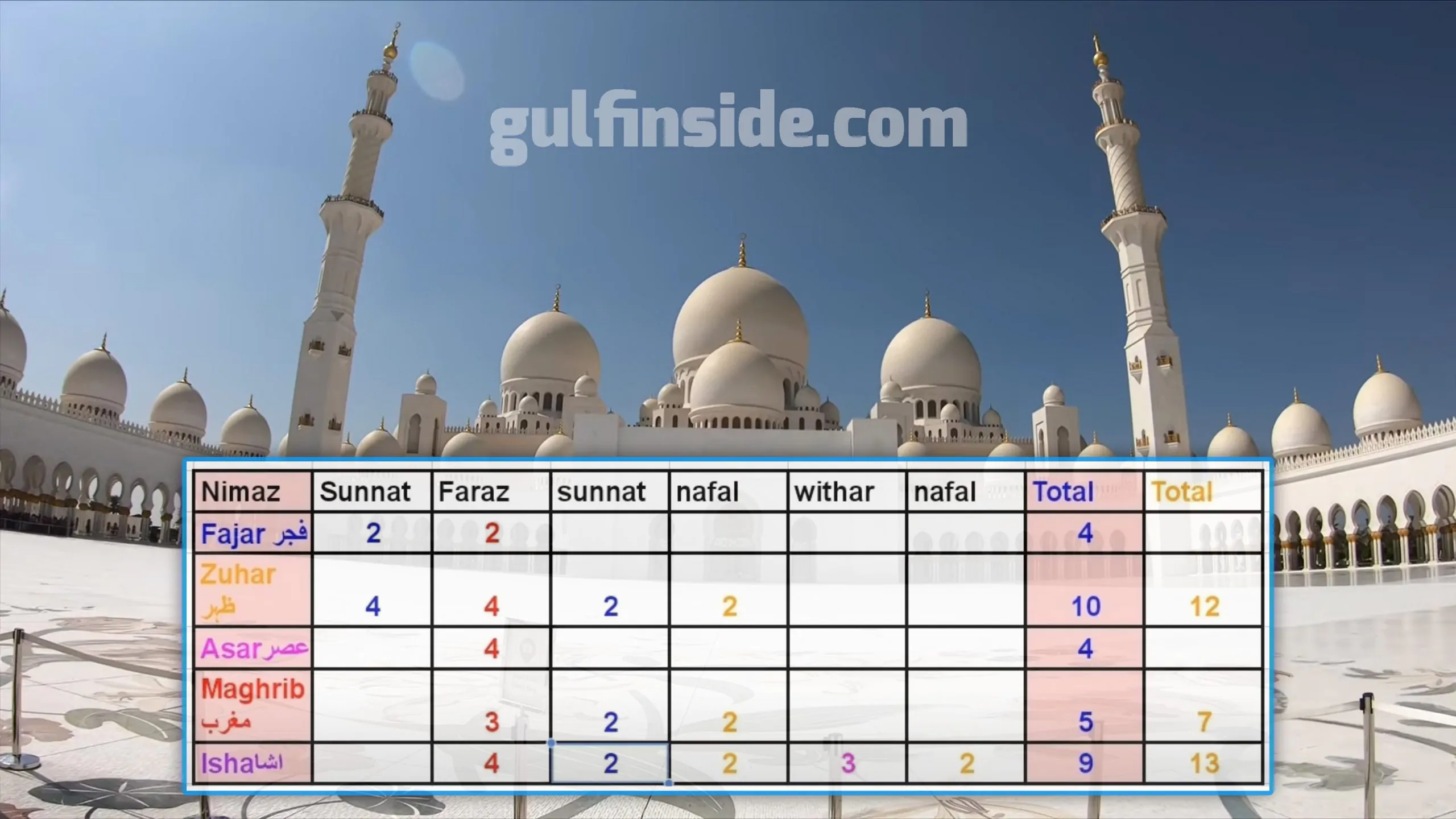Abu Dhabi Prayer Times
Prayers Time in Abu Dhabi & select your city and check the latest prayer time in different cities of UAE
ABU DHABI – DUBAI – AJMAN – FUJAIRAH – RAS AL KHAIMAH – SHARJAH – UMM AL QUWAIN – AL AIN
Muslim Prayers: Prayer Time Abu Dhabi, Adhan and Rak’ah
Reward
Prayer, which means ‘prayer’ or ‘supplication’, is also known as prayer (Namaz) non-Arab Muslims. Prayer is one of the five pillars of Islam, which form the basic tenets and practices of the religion. The five pillars are:
The profession of faith (martyrs). There is no god but Allah and Muhammad (peace be upon him) is the Messenger of Allah.
- Prayer
- Charity (Zakat)
- Fasting
- Hajj (Hajj)
Prayer is obligatory for adult Muslims and the times of prayer are determined according to the movement of the sun and are performed five times a day as follows:
Fajr: Before sunrise
Zuhr: Noon, after passing through the highest point of the sun
Asr: The last part of the afternoon
Maghrib: After sunset
Isha: Between sunset and midnight
Praying In The Mosque

Muslims can pray anywhere. However, many Muslims pray in congregation in the mosque. The mosque is a place of worship for Muslims. Praying together in congregation helps Muslims to understand that all humanity is one and all are equal in the sight of God.
Friday (Jumma)
In addition to the five daily prayers, the Friday prayer is also obligatory. This Friday prayer is performed on Friday instead of the Zuhr prayer with a sermon in congregation.
Adhan: Adhan For Prayers
The public call to prayer is called the call to prayer. The call to prayer is given from the mosque by a muezzin, who is the appointed worshiper of the mosque. During the call to prayer, the muezzin recites the following takbeer (glorification of God) “Allah Akbar”, which translates as “Allah is Great”.
The Complete Call To Prayer Is As Follows:

Allahu Akbar (Allah is Great)
I bear witness that there is no god but Allah.
Ashad Anna Muhammad Rasoolullah (I testify that Muhammad is the Messenger of Allah)
Haya Salat (hurry up for prayer, or get up for prayer)
Hiya al-Falah (Hurry for success, or get up for salvation)
alsalat khayr min al nawm (Prayer is better than sleep.
Allahu Akbar (Allah is Great)
There is no god but Allah.
What Is The Significance Of The Call To Prayer?
Adhan is given five times a day to invite Muslims to perform the obligatory prayers. In countries with large Muslim populations, it is common to hear the call to prayer in public. The call to prayer is usually recited from the minarets of mosques and is usually given facing the Ka’bah in Makkah.
Performing Ablution (wudu) Before Prayers
Wudhu is the act of performing ablution or washing one’s body before praying or reciting the Qur’an.
For a step-by-step guide on ablution, take a look here.
Rak’ats in Salat.

One rak’ah consists of suggested movements and recitation of verses from the Qur’an that Muslims practice while praying to Allah. It also refers to the only unit of Islamic prayers.
Fajr
Fajr prayers should be offered in the last part of the night and before sunrise. The Fajr prayer consists of two obligatory rak’ats called fard.
Duhur (Zuhr)
The Duhr (Zuhr) prayer is the second prayer of the day and is offered at the time of Zuhr. This prayer consists of four obligatory rak’ats.
Asr
Asr prayers are offered after Zuhr prayers. This prayer consists of four obligatory rak’ats.
Maghrib
The evening prayer should be offered at sunset. The evening prayer consists of three obligatory rak’ahs.
Isha
The fifth prayer of the day is Isha prayer. It consists of four obligatory rak’ahs.
Along With These Five Obligatory Prayers, There Are Other Prayers As Well:
- Friday Prayers or Jummah Prayers performing on (Friday afternoons).
- Tahajjud prayer (performed early in the morning. However, it is not mandatory).
- Taraweeh prayers (performed with Isha prayers and only during the holy month of Ramadan).
- Eid prayers (performed on Eid-ul-Fitr and Eid-ul-Adha).
Benefits Of Different Positions During Prayer:
There are different places of prayer which include standing, bowing, prostration and tashahhud. These actions have numerous benefits such as:
- Standing (standing): It ensures proper blood flow to the lower part of the body, strengthens the leg muscles.
- Bowing: This posture is good for the lower vertebral column. It relieves and prevents back pain. This involves stretching the elbows, wrists, knees and ankles, thus creating flexibility in all these parts of the body.
- Prostration: Leaning towards the qiblah or prostrating for God. Prostration maintains blood flow to the brain and stimulates the pituitary gland and pineal gland.
- Tashahhud (sitting posture): This posture is similar to Vajrasana, an important yoga position. This position is said to strengthen the thigh and calf muscles, improve digestion and keep the spine straight and upright.
COMMENTS